
Federico Fellini, was an Italian film director and screenwriter known for his distinctive style, which blends fantasy and baroque images with earthiness. He is recognized as one of the greatest and most influential filmmakers of all time. His films have ranked in polls such as Cahiers du cinéma and Sight & Sound, which lists his 1963 film 8 1⁄2 as the 10th-greatest film.

Giovanni Rota Rinaldi, better known as Nino Rota, was an Italian composer, pianist, conductor and academic who is best known for his film scores, notably for the films of Federico Fellini and Luchino Visconti. He also composed the music for two of Franco Zeffirelli's Shakespeare films, and for the first two films of Francis Ford Coppola's Godfather trilogy, receiving the Academy Award for Best Original Score for The Godfather Part II (1974).

Jacques Tati was a French mime, filmmaker, actor, and screenwriter. Throughout his long career, he worked as a comic actor, writer, and director. In a poll conducted by Entertainment Weekly of the Greatest Movie Directors, Tati was voted the 46th greatest of all time. With only six feature-length films to his credit as director, he directed fewer films than any other director on this list of 50.

Amarcord is a 1973 Italian comedy-drama film directed by Federico Fellini, a semi-autobiographical tale about Titta, an adolescent boy growing up among an eccentric cast of characters in the village of Borgo San Giuliano in 1930s Fascist Italy. The film's title is a univerbation of the Romagnolo phrase a m'arcôrd. The title then became a neologism of the Italian language, with the meaning of 'nostalgic revocation'.
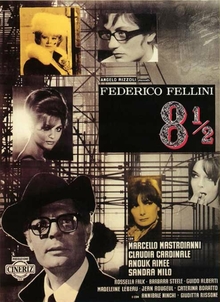
8 1⁄2 is a 1963 Italian surrealist comedy-drama film directed by Federico Fellini.

Sylvain Chomet is a French comic writer, animator and film director.
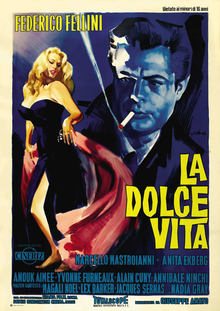
La Dolce Vita is a 1960 comedy-drama film directed and co-written by Federico Fellini. The film follows Marcello Rubini, a journalist writing for gossip magazines, over seven days and nights on his journey through the "sweet life" of Rome in a fruitless search for love and happiness. The screenplay, co-written by Fellini and three other screenwriters, can be divided into a prologue, seven major episodes interrupted by an intermezzo, and an epilogue, according to the most common interpretation.

Nights of Cabiria is a 1957 Italian drama film directed by Federico Fellini and starring Giulietta Masina, François Périer, and Amedeo Nazzari. Based on a story by Fellini, the film is about a prostitute in Rome who searches in vain for true love.

Gustavo Adolfo Rol was an Italian thinker and painter. His devotees consider him to have been a great spiritual master and have testified to miraculous feats he supposedly accomplished.

My Voyage to Italy is a personal documentary by acclaimed Italian-American director Martin Scorsese. The film is a voyage through Italian cinema history, marking influential films for Scorsese and particularly covering the Italian neorealism period.
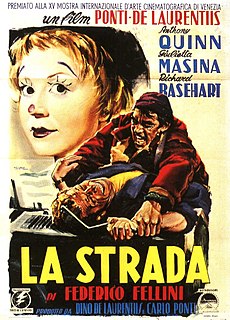
La strada is a 1954 Italian drama film directed by Federico Fellini from his own screenplay co-written with Tullio Pinelli and Ennio Flaiano. The film tells the story of Gelsomina, a simple-minded young woman bought from her mother by Zampanò, a brutish strongman who takes her with him on the road.

Intervista is a 1987 Italian film directed by Federico Fellini.
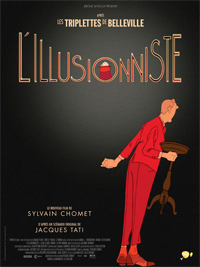
The Illusionist is a 2010 French-British animated film directed by Sylvain Chomet. The film is based on an unproduced script written by French mime, director and actor Jacques Tati in 1956. Controversy surrounds Tati's motivation for the script, which was written as a personal letter to his estranged eldest daughter, Helga Marie-Jeanne Schiel in collaboration with his long-term writing partner Henri Marquet, between writing for the films Mon Oncle and Play Time.
Django Films is a film studio run by the Oscar nominated French animator Sylvain Chomet. The studio, named after the jazz guitarist Django Reinhardt, is based in Edinburgh, Chomet's adopted home. It produced The Illusionist, based upon a previously unproduced script by Jacques Tati, as well as "The Triplets of Belleville " and "La Vielle Dame et Les Pigeons". The Django Films studio was set up solely to make this film, and is now being dismantled.
The 38th Annual Annie Awards honoring the best in animation of 2010 was held February 5, 2011, at Royce Hall in Los Angeles, California. DreamWorks Animation's How to Train Your Dragon was the big winner winning 10 out of its 15 nominations, sparking a big controversy.

Brunello Rondi was a prolific Italian screen writer and film director best known for his frequent script collaborations with Federico Fellini.

The Old Lady and the Pigeons is a 1997 animated short film written and directed by Sylvain Chomet. It tells the slightly surreal story of a starving policeman who dresses up as a pigeon and tricks an old lady into feeding him. The film was produced through the French company Les Armateurs with support from companies in Canada, Belgium and the United Kingdom. It was Chomet's debut film and won several awards including the Grand Prix at the Annecy International Animated Film Festival.
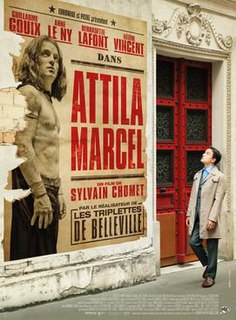
Attila Marcel is a 2013 French comedy film written and directed by Sylvain Chomet.
"Chanson Illusionist" is a song recorded by French animator and musician Sylvain Chomet for the official soundtrack to the 2010 animated film, The Illusionist. It was distributed digitally on 14 December 2010 through Warner Bros. Records and Milan Records, along with the rest of the parent album. Chomet wrote the piece while Terry Davies conducted and arranged its production.
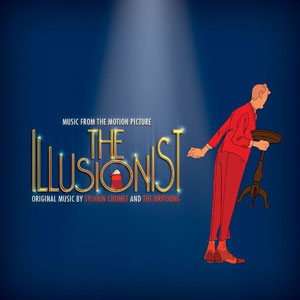
The Illusionist: Music from the Motion Picture is the official soundtrack to the 2010 animated film The Illusionist. The album was released through Milan Records and Warner Bros. Records on 14 December 2010. The songs on the record were either or orchestrated by the film's director, Sylvain Chomet, or performed by Malcolm Ross under the fictional band name The Britoons. It was generally well received, with particular praise for the songs' storytelling and its "effortless" sound.
















